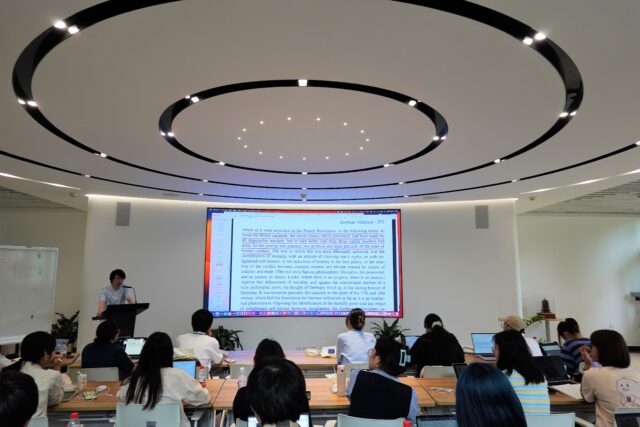The second day of the Summer Institute, following an exhausting climb along the Great Wall of China, provided an intriguing intellectual journey. Professors Hoshino and Wang delivered thought-provoking lectures in the historical Russian Building of Yuanpei College, with a central theme revolving around “Intimacy and Feeling.” Professor Wang’s lecture, in particular, delved into the intricate realm of “Nihilism,” a discourse that left our minds both impassioned and perplexed.
In 1941, amid the backdrop of World War II, Leo Strauss presented a lecture titled “German Nihilism.” Strauss’s conception of nihilism differs significantly from the common understanding of the term. Instead of merely denoting a sense of emptiness or meaninglessness, Strauss’s nihilism portrays a desire for conflict over peace, which could be called “militarism”. It is within this context that we explore the origins and evolution of nihilism.
Leo Strauss argues that liberalism is the source of nihilism, which is a central idea in his thinking. It’s ironic because we often don’t realize that nihilism’s roots are in liberal principles. In today’s world, we see global tensions and countries like Japan increasing their military spending in the name of countering ideologies like communism. This militaristic approach is often driven by the rationality associated with liberalism, which, in a twist of logic, leads to what can be considered “reasonable” wars.
Leo Strauss suggests that to understand the strong connection between nihilism and liberalism, we should go back to a time before liberalism became dominant. This means exploring ancient pre-modern philosophy, a period when a different way of thinking prevailed before the rise of what we call “rationalism.” By doing this, we can break free from blindly believing in liberalism’s goodness solely because it appears reasonable. In today’s world, heavily influenced by modernization, commercialism, capitalism, and liberalism, it’s crucial for people to engage in deep and critical thinking rather than unquestionably embracing these ideologies with optimism.

Reported by Kentaro Kawato (EAA Youth)








